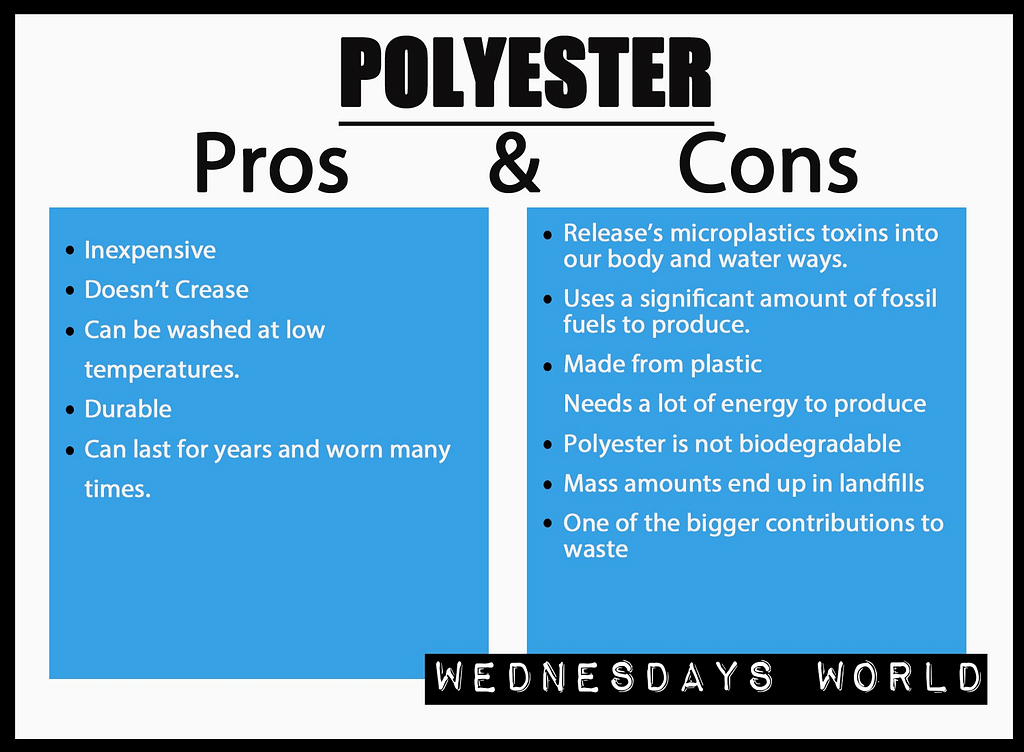The Fashion industry has been using polyester for many years. To help resolve the problems we face with Climate change, areas in the fashion industry are making substantial changes to reduce the amount of plastic that is used to then reduce the amount of fossil fuels.
Polyester is a form of plastic. Crude oil is distilled for the gasoline that is put into cars. During the distilling process other chemicals are released one of these chemicals is called ethyne.
Ethyne after some procedures is used to produce plastic in the form of pellets, this is then melted into plastic we see today like bottles the thinner it is pressed it can be cut in to string to make yarn like threads to form polyester making fossil fuels the main ingredient.
The pros and cons of polyester

Patagonia (The Godfather of Sustainable Fashion) are aware of the cons that come with polyester, however would still like to maintain a standard by using it. They have made it their mission to find ways to source polyester and maintain their ethical morals.
“An important fibre in our line, polyester allows us to build lightweight materials that dry quickly and can be used in a variety of applications, including trail-running tops and yoga leggings. Polyester also blends well with natural fabrics like cotton. But virgin polyester is derived from petroleum, which comes at a high environmental cost.” – Patagonia
REUSE WASTE
Fast fashion has been a cheaper and quicker to produce. Encouraging shops to create new stock frequently, then using marketing tools to keep us on trend. But it is time to look at why do we need to consume so much to just throw it away creating more waste
With the amount of landfill waste Pasha Whitmore (Patagonia material developer) has been looking into how they can use waste materials to recreate a product. They have been finding ways to use recycled plastics to keep using polyester due to it being durable and water resistant and holds fabrics together better
To continue to benefit from the qualities polyester offers, Patagonia focuses on recycling plastics and other polyester fabrics. Recreating the durable quality fabric they are used to.

“Using recycled polyester reduces our reliance on petroleum as a source of raw materials. Utilises waste and reduces greenhouse gas emissions from manufacturing. Plus, by using recycled polyester, we can promote new recycling streams for polyester clothing that is no longer wearable.” – Patagonia
Patagonia wants to maintain the quality of how they use polyester, so are looking for long term solutions that will reduce their carbon footprint and create the same level of quality. They are also looking into chemical-recycling technologies that will allow them to reuse recycled garments to create a circle of production. Rather than, Make, Buy, Waste (end) they aim for a Make Buy Recycle Make and so on cycle.
Sourcing recycled Plastics
Patagonia keeps the whole thing ethical by sourcing recycled materials, from supply chain partners that have been certified to approved third-party standards, including the Recycled Claim Standard (RCS) and Global Recycled Standard (GRS) certifications.
Plastic in fashion is being heavily pushed by the plastic industry to keep making these polyester fibres so as long as the plastic industry keeps making it the longer the fashion industry keeps sourcing it
As a result of not using virgin polyester, Patagonia managed to avoid emitting more than 4.4 million pounds (about 1995804.8 kg) of CO2e into the atmosphere. As of Spring 2023 season, 87% of Patagonia’s polyester fabrics will be made with recycled polyester.

